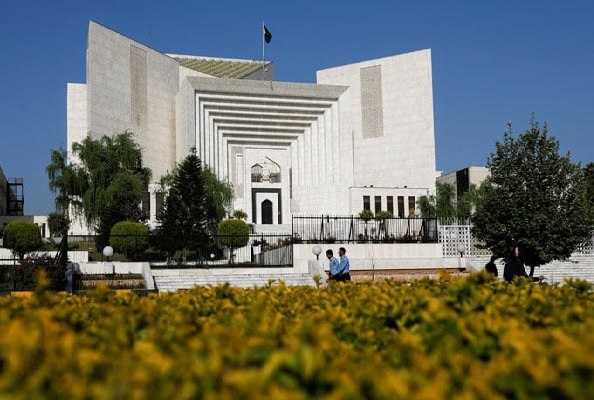KARACHI: Pakistan Stock Exchange above the 98,000 mark on Friday as share prices surged more than 2,000 points in intraday trade
ISLAMABAD: The Supreme Court directed the Election Commission of Pakistan (ECP) to consult with President Arif Alvi for polls in Punjab and Governor Ghulam Ali for elections in KP, so that elections could be held within the stipulated timeframe of 90 days.
The verdict of three to two cautioned Governor Ali that he was in breach of his constitutional responsibility since he did not announce the date for elections after the provincial assembly was disbanded.
As it set aside the Feb 20 decision of the president to hold a poll in KP on April 9, the court ordered the governor to fix the election date after consultation with the ECP.
The majority judgement, given by Chief Justice Umar Ata Bandial, Justice Munib Akhtar, and Justice Muhammad Ali Mazhar, however, allowed the ECP to propose a poll date that deviates from the 90-day deadline by the “barest minimum”, in case of any practical difficulty.
The leeway was given since the court was “informed that on account of delay in the emergence of the poll dates, it may not be possible” to meet the deadline. It was also the case that possibly on account of a misunderstanding of the law, the ECP did not make itself available for consultation as required under Section 57 of the Elections Act 2017, the majority judgement said.
On the other hand, the minority view, given by Justice Syed Mansoor Ali Shah and Justice Jamal Khan Mandokhail, was that the suo motu was initiated with “undue haste” and was “unjustified”.
There was no justification to invoke the extraordinary jurisdiction under Article 184(3) of the constitution for initiating suo motu proceedings or entertain petitions under Article 184(3) since a single bench of the Lahore High Court (LHC) has already decided the matter in favour of the petitioner on Feb 10 and the judgement was still in the field, it added.
Likewise, the intra-court appeals filed before LHC are still pending, and besides, none of the petitioners before the high court has approached the Supreme Court under Article 185(3), the judgement said.
The minority ruling further explained that the suo motu and the two petitions in the light of the principles settled in the Manzoor Ilahi and Benazir Bhutto cases, do not constitute a fit case to exercise extraordinary original jurisdiction of the Supreme Court under Article 184(3). The detailed judgement will come later.
Whereas the majority judgement said, since the election on the dissolution of the provincial assembly has to be held within a time period stipulated by the constitution, the president or the governor must discharge the constitutional responsibility of appointing a date for the election within the shortest time possible.
Likewise, the ECP must proactively be available to the president or the governor and be prepared for such consultation as required for a date for the holding of general elections, the ruling said and added that in relation to the dissolution of the Punjab Assembly, the constitutional responsibility for appointing a date for the general election that must follow was to be discharged by the president.
The constitutional responsibility for appointing a date for the general election that must follow was to be discharged by the governor, the judgement said, also explaining that the Feb 20 order of the president was “constitutionally competent and thus affirmed insofar as it applies to the Punjab Assembly”.
In the case of KP, the same is “constitutionally invalid insofar as it applies to KP assembly” and is set aside, the judgement said.
The judgement also emphasised that it was the constitutional duty of the federation, in terms of Article 148(3), to ensure that the government of every province was carried on in accordance with the provisions of the Constitution.
There can be no doubt that this duty includes ensuring that a general election to the assembly of every province is held, and enabled to be held, in a timely manner within the period set out in the constitution, it added.
This duty is in addition to, and applies independently of, the duty cast under Article 220 on all executive authorities in the federation and in the provinces to assist the Chief Election Commissioner (CEC) and ECP in the discharge of his or their functions, as per the order.
The court said the federation and in particular the federal government is obligated, on an immediate and urgent basis, to forthwith provide ECP with all such facilities, personnel and security as it may require for the holding of the general elections.
In like manner, it is the duty of the provincial governments, acting under the caretaker cabinets, to proactively provide all aid and assistance as may be required by ECP, the judgement said. The three matters (suo motu and two petitions) are found maintainable and stand disposed of, the majority judgement said.
The judgement also explained that parliamentary democracy was one of the salient features of the constitution. There can be no parliamentary democracy without parliament or the provincial assemblies and there can be neither parliament nor provincial assemblies without the holding of general elections as envisaged, required and mandated by and under the constitution, the judgement said.
You May Also Like
TEHRAN: The head of Iran’s Revolutionary Guards described the arrest warrant issued by the International Criminal Court for Israeli Prime
LOWER KURRAM: The death toll in yesterday’s gun attack on passenger vans in Khyber Pakhtunkhwa’s Lower Kurram has risen to 42,






